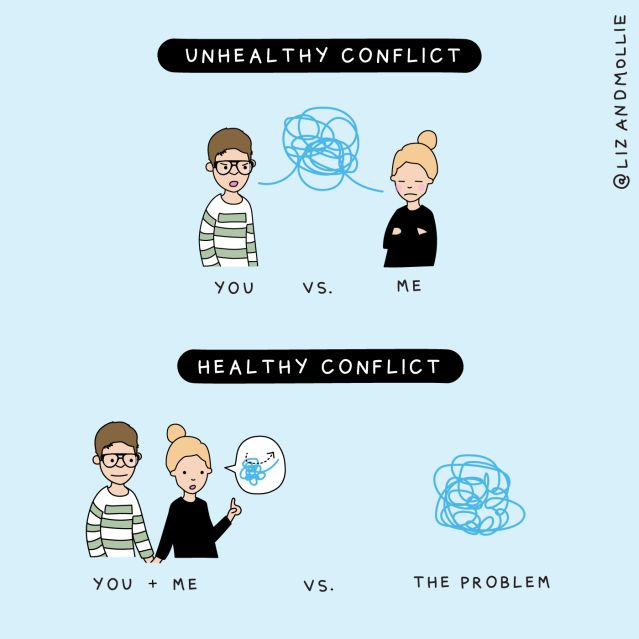Relationships
100 Percent of Couples Have Conflict. This Could Help.
A strategy that can be a game-changer for managing conflict.
Posted September 28, 2023 Reviewed by Gary Drevitch
Key points
- Long–term relationships are a constant negotiation of time, resources, skills, preferences, and problems.
- Reframing a problem as external to the relationship makes it less threatening and more solvable.
- Reframing can change how communications with your partner feel, even if challenges keep coming.
My life raising two kids under the age of 10 is full of whispered side conversations with my spouse.
“Little guy is losing his mind, what’s our move?”
“I can handle the older if you want to run around with the little.”
“Sounds good, teamwork on 3.”
That’s on our best day. On other days, it’s more strained. It’s less obvious what the solution should be, or the situation seems charged with relationship tension, too. Is my approach annoying you? Are we on the same page? Did I get the worse job in this deal? Wait, I can’t hear you over the sound of our kids yelling at each other.
Long–term relationships are a constant negotiation of time, resources, skills, preferences, and problems (big and small). Especially when you’re caring for kids, aging parents, or even pets, there are so many things to figure out and work through. Advice about how to do this without lashing out at your partner can feel complicated or unrealistic. How good are you at using “I feel” statements during a 10–second whisper conversation about how to manage a kid on the edge? Probably not great.
When the moment calls for quick problem-solving, there is one move that is both essential and effective. If you can learn it and use it regularly, it might change a lot about how your communications with your partner feel – even as the problems and challenges keep on coming.
Instead of viewing what’s happening as a problem between you and your partner, shift the lens to see it as a problem you and your partner are going to try and fix together.
No one illustrates this better than Liz Fosslein:

When we’re stressed and overwhelmed, we often direct that negativity straight at our partners: “If you weren’t doing X (or were doing Y), this situation would be better. YOU are the problem!”
Most of the time, the root problem isn’t really about the other person. If you can uncover that root problem and tackle it, the issue is no longer about the relationship. By reframing the problem as external to the relationship, it becomes less threatening, less maddening, and more solvable.
The trick is to retrain yourself to stop turning on your partner when things go wrong and start to see the problem as something to figure out together. It helps if both people are trying to do this at the same time, but even if you’re the only one with this mindset, you can potentially lead your partner along to a more collaborative strategy. Problem-solving is a team sport, so give your partner an awkward high–five and get to work.


